Around 2 million potholes are repaired each year in England & Wales, the equivalent of one every 16 seconds.
In 2023 alone, it is estimated that...
2 million

£143.5 million
was spent on pothole repairs
£28.8 million
was spent on compensation
*Figures from ALARM Survey, published 19/03/2024
Choosing the right material for pothole repairs
Tarmac have developed a range of material options for highway repairs, depending on the plant and equipment available and how maintenance teams prefer to work. Investing in smarter materials can help highways maintenance engineers to save time increase productivity and ensure high quality, permanent repairs.
Permanent Cold Lay Pothole Repair
ULTIPATCH POTHOLE
Access to materials - Saving time on pothole repairs. Ultipatch Pothole is a cold lay asphalts that allows instant access to materials from depots, either in bulk loads or in user friendly smaller bags. This can save time and help highways maintenance team to respond quickly to emergency call outs or complete more work per shift.
Availability:
25kg bags, 25kg tubs, Bulk delivery
Site mixed asphalt for use with asphalt heaters
ULTIPATCH SITEMIX
Helping our customers to avoid waste has been a key aim when designing Tarmac’s range of asphalts. Using pothole repair asphalts in just the right amount and advanced asphalts that stay usable for longer, big reductions in wasted materials can be achieved.
Availability:
20kg bags, Bulk delivery
For use with:
Asphalt heaters
Longer lasting hotbox asphalt
ULTILIFE HOTBOX
The full compaction of the asphalt is vital to achieve a durable defect repair, with temperature being paramount. Tarmac provide hot asphalts that have extended life to ensure highways teams are able to attain correct compaction throughout all of the working day. Cold lay asphalts supplied in bulk or prepacked offer alternative solutions, along with site mixed asphalt, that provided fresh hot asphalt at the point of use.
Availability:
Bulk delivery
For use with:
Hotbox storage
Pothole repairs in cold and wet weather
ULTIPATCH VIAFIX QUICK
Few of us perform better in the British rain. Something that does is ULTIPATCH Viafix Quick, an extreme performance, all weather, HAPAS approved Permanent Cold-Lay Surfacing Asphalt. It remains workable even in very low temperatures and rainwater actually helps it to harden.
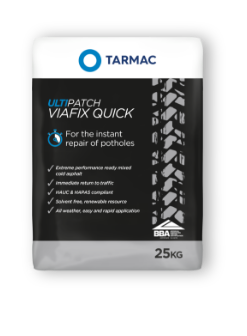
Repairing damage to concrete roads
Sometimes the causes of potholes are deeper. Over 1,200km of concrete pavement are thought to be in use on National Highways' strategic road network, with more across the local authority network. Failure and movement in the base of the road will cause repeated failure of any surface repair unless it is put right. Tarmac supply a wide range of specialist concretes and mortars designed and approved for use on highways.
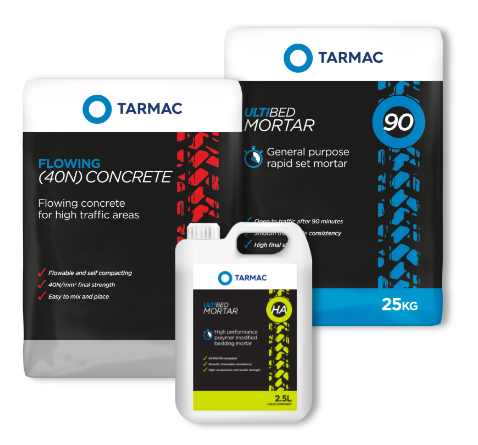
Reinstatement and repair of footpaths
BBA HAPAS cold-lay asphalt for fast, permanent footpath reinstatement.
Developed for a fast, effective, permanent reinstatement for footway, footpaths and cycle tracks. ULTIPATCH FOOTWAY is designed for the utility sector, combining a long storage life with excellent workability and surface finish.
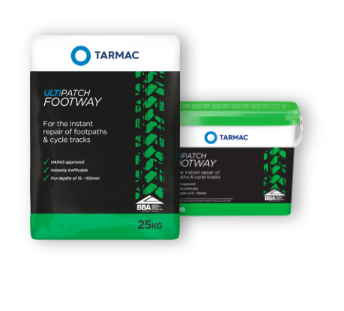
Get the right repair material or advice on specific challenges
What causes potholes?
Potholes are caused by water ingressing into the road through existing cracks and then the subsequent action of freeze/thaw. The action of traffic further enlarges the diameter of the pothole. This sets up a cycle of damage where larger cracks and voids allow more water and ice formation within the road. Instability in the road base or underlying ground can also cause damage in the surface course often requiring deeper reconstruction of the road.
How many potholes are repaired each year?
Around 2 million potholes are repaired each year in England & Wales, the equivalent of one every 16 seconds. According to industry figures taken from the annual 2024 ALARM survey on the condition of the UK road network, £143.5 million was spent on pothole repairs in England and Wales in 2023.
What risk do potholes cause to road users?
Potholes present a risk to road users, causing potential harm to people and damage to vehicles. They also represent a cost to local authorities from compensation claims.
What is the cost of pothole compensation claims?
Around £28.8 million is spent on compensation to roads users. This includes £15.2 million in direct compensation to road users (89% specifically relating to potholes) and £13.6 million on staff costs to deal with the claims. A faster response to reported potholes can reduce these claims and the drain on budgets.
*Figures from ALARM Survey, published 19/03/2024
We know
our roads
Since Tarmac invented the modern road surface in 1902, we have been at the forefront of technological advances in asphalt materials, working with highways engineers to produce surfaces that last longer and can be laid with less disruption to the road user. Today we are helping the industry to work more sustainably, by producing less waste and fewer carbon emissions.

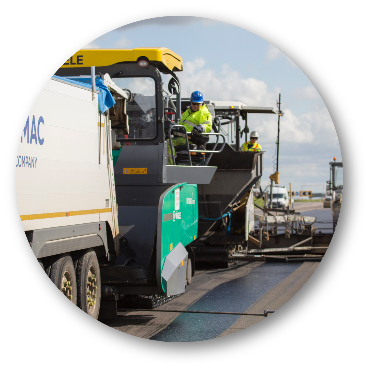
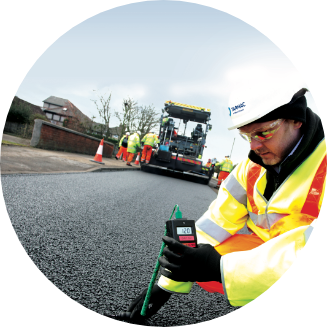
Get advice on pothole repairs
Today we share our knowledge and expertise via a network of Specialist Products advisors and Technical Product Support Managers, who can help you to select the right material for the job.
For help in choosing the right repair material or advice on specific challenges, call us
Reactive vs planned pothole repairs
The average cost of reactive pothole repairs in England and Wales was £87.76 compared to £56.76 for planned repairs. Much of this additional cost is due to time taken to collect materials, travel to site and materials wastage. The correct choice of materials can reduce this cost.
Better ways of working
The price of the asphalt material is a low proportion of the defect repair cost. Having to return to site for a failed repair is the ultimate false economy. This means that there are big cost savings to be made in selecting the most appropriate and higher performing materials and getting road repairs right first time and avoid the cost of repeated repairs.
No highways engineer needs to be reminded that potholes are a one of the industry's most persistent challenges. The winter season elevates the issue and results in increased views being expressed by road users and media coverage. Although for many local authorities, it must seem like an endless battle, investing in smarter materials can help them seize the advantage, by saving time, increasing productivity and ensuring high quality, permanent repairs.
Right first-time pothole repairs
Pothole repairs can fail due to issues relating to the actual defect method and materials or because of more serious underlying formation issues that require reconstruction at a later date. Optimum results start with understanding the nature of the problem and selecting the right choice of material.
The use of hot asphalt will be the preferred choice, however, circumstances may preclude availability, or the quantities required to not require bulk quantities. Another consideration is the quality of conventional hot asphalt at its time of use. If it has cooled, the correct level of compaction cannot be achieved which will result in failure.
Tarmac’s expertise has developed a range of specialist asphalts that provide, longer lasting more workable hot asphalts, cold lay asphalts in bulk delivery, bags or tubs and site mixed asphalts heated in just the right quantity and temperature at the point of use.
For help in choosing the right repair material or advice on specific challenges
Drop in,
load up,
drive out
Collect Asphalt
Tarmac are an industry leader in the supply of high quality asphalts. Our Asphalt2Go collect asphalt service offers a priority asphalt collection service from our large network of quality assured UK asphalt plants.
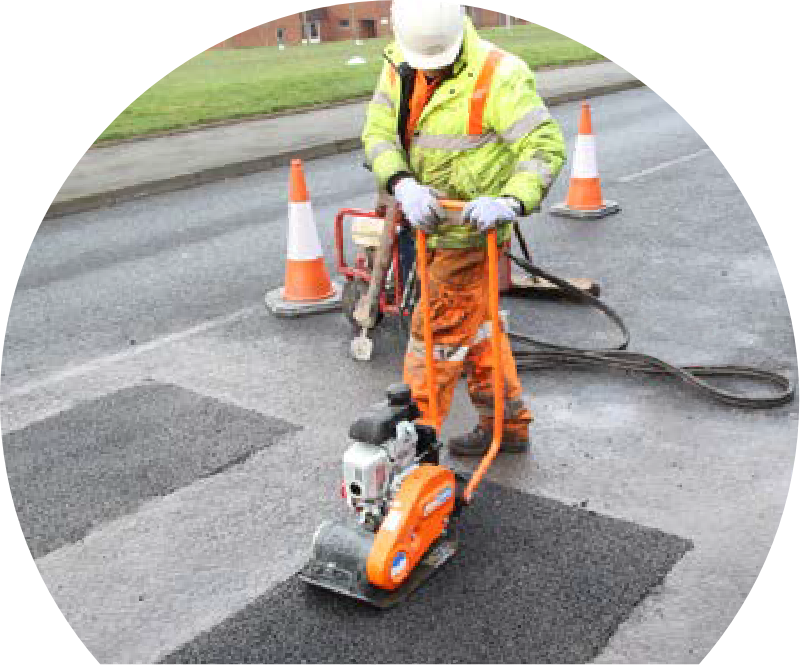

Across the UK
We can provide everything you need, from high quality asphalt to fast delivery readymixed concrete. We offer welfare facilities and a shop for all your accessories all onsite.
To order, call your local Asphalt2Go site.


